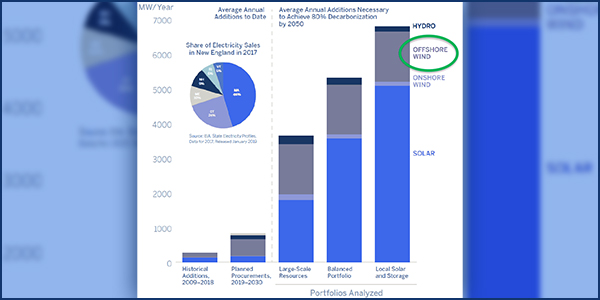Massachusetts’ two U.S. senators on Friday urged ISO-NE to prioritize “state climate, energy and health goals” when evaluating responses to a request for proposals seeking transmission projects to address the 2024 retirement of the Mystic Generating Station near Boston.
Sens. Ed Markey and Elizabeth Warren, both Democrats, sent a letter criticizing the RTO’s Boston 2028 RFP planning process for listing “environmental impact” in the lowest priority category for evaluation, noting that “public health impacts are not called out at all.”
“In particular, the eventual retirement of this power plant, which is the largest fossil fuel plant in New England, presents an opportunity to continue cleaning up the New England power grid and safeguarding public health,” they said. “The six New England states have all committed to achieving at least a 75% reduction in their greenhouse gas emissions by 2050. The Carbon Free Boston initiative aims to reach a target of carbon neutrality for the city by 2050. As part of the Boston 2028 RFP, ISO-NE should consider and prioritize these targets.”
ISO-NE spokesman Matthew Kakley declined to comment Friday, saying the RTO had just received the letter and was still reviewing it.
The RTO received 36 phase one proposals in response to the request, with costs ranging from about $49 million to $745 million, and in-service dates ranging roughly from mid-2023 to 2026.
The RTO’s transmission planners will share their draft list of qualifying proposals at a Planning Advisory Committee meeting June 17.
Both Markey and Warren last November joined five of their fellow New England senators in sending a letter to the RTO accusing it of “preserving the status quo of a fossil fuel-centered resource mix” in its fuel security planning triggered by the Mystic retirement. (See Senators Ask ISO-NE to Heed States on Clean Energy.)
Side Pressure
“As Massachusetts and other New England states work to reach decarbonization targets and respond to the ongoing COVID-19 pandemic, it is more important than ever that regional transmission organizations consider these impacts as part of electric-grid planning,” the senators said.
Eight qualified transmission project sponsors submitted bids for the Boston RFP. Among them was Anbaric Development Partners, which in March announced details of its proposed 900- to 1,200-MW Mystic Reliability Wind Link transmission project, including an option for an additional 1,200 MW of transmission capacity. (See ISO-NE Planning Advisory Committee: March 18, 2020.)
“Additionally, as Massachusetts and other New England states continue efforts to limit and stop the spread of COVID-19, it is important to consider the public health effects of various kinds of electricity generation,” the senators said. “Research continues to show a link between air pollution and higher COVID-19 death rates, placing a premium on regional transmission organizations’ factoring air quality into their grid-planning decisions — particularly for communities that are disproportionately affected by COVID-19 and the historic burden of air pollution.”
Last June, about 300 people turned out in Springfield, Mass., to attend a Department of Energy Resources hearing on a proposal to alter the state’s renewable portfolio standard to include biomass plants. (See Residents Protest Biomass at Mass. DOER Hearing.)
Among the nearly 60 people testifying were a dozen biomass industry proponents and five members of the Springfield City Council opposing plans by Palmer Renewable Energy for a 35-MW wood-burning plant in East Springfield.
“Clean energy and clean air are both important policy objectives for Massachusetts and the broader New England region, and those priorities should be reflected appropriately among the evaluation criteria for the Boston 2028 RFP,” the senators said.
Last August, about 40 environmental activists marched in front of the headquarters of Connecticut’s Department of Energy and Environmental Protection to protest state regulators’ approval of a new gas-fired power plant in the town of Killingly. (See Connecticut Activists Protest Gas-fired Plant.)
The Connecticut Siting Council last June approved construction of the 650-MW Killingly Energy Center by Florida-based developer NTE Energy, permitting the plant to emit up to 2.2 million tons of carbon dioxide each year.
“Fossil fuel plants are increasingly uneconomic, particularly as the cost for new renewable electricity generation declines, and after factoring in the costs to public health from air pollution,” the senators said. “In pursuing transmission solutions to meet electricity demand and address reliability needs, ISO-NE can also strive to better integrate low- or no-carbon generation projects, with the added benefit of saving ratepayers money and avoiding the need to bail out uneconomic plants.”




